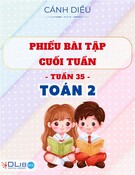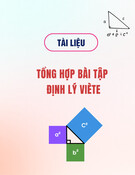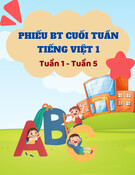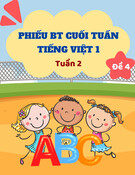
KIỂM TRA GIỮA HỌC KÌ I KHOÁI 10 ĐỀ2
MÔN: TIẾNG ANH
THỜI GIAN: 45 PHÚT
A- MULTI-CHOICE: (5pts)
I- Choose the word which has the underlined part pronounced differently from the
rest. (0.75pt)
1. A. name B. father C. party D. army
2. A. sport B. wrong C. walking D. call
3. A. cook B. afternoon C. school D. tooth
II- Choose the underlined part among A, B,C or D that needs correcting. (0.75pt)
4. Did you used to go on business?
A B C D
5. I've been studying French since I've started high school.
A B C D
6. I can't find my diary, that is a real nuisance.
A B C D
III- Choose A, B, C, or D that best completes each unfinished sentence; best substitutes
the underlined part; or has the same meaning to the sentence above. (3.5pts)
7. A: What will we do when we want to call the Fire Service?
B: _____________________________________________________________
A. Dial 113 B. Dial 114 C. Dial 115 D. Dial 116
8. A: (2)______________________________________________________________
B: On Saturday, I participated in the local charity society to visit Nguyen Dinh Chieu
Special School for the Blind.
A. What do you do? B. Where did you go on Saturday?
C. What did you do on Saturday? D. What were you doing on Saturday?
9. Life must be hard for people who do not have a job in our society today.
A. the unemployed B. the poor C. the rich D. the old
10. People ____live in glass houses shouldn't throw stones.
A. who B. that C. whom D. A&B are correct
11. They have built a new bridge across the river.
A. The new bridge across a river has been built.
B. A new bridge has been built across the river.
C. The new bridge has built across the river.
D. A bridge has been built new across the river.
12. Yesterday I arrived at the party after Tom …………….
A. had left B. left C. has left D. have left
13. We ………………to Da Lat several times. It's a foggy city.
A. have been B. were C. were being D. would go
14. Some children in the village are………………retarded.
A. mental B. mentalist C. mentality D. mentally

15. John is reading a novel _____was written by Jack London.
A. who B. whom C. which D. whose
16. Our teacher is very proud …………….her work.
A. in B. at C. of D. with
17. Claude didn't _______ in Canada.
A. lived B. use to live C. used to live D. used to living
18. Peter often .................. breakfast at 8 o'clock. He usually .................. an enormous
breakfast.
A. have / eat B. have / eats C. had / ate D. has / eats
19. They planned .................. in the evening.
A. to go dancing B. going to dance C. going dancing D. go to dance
20. ................. did you eat today? - At Dong Phuong restaurant.
A. Who B. Why C. How D. Where
B- WRITING: (5pts)
IV. Fill each gap with a word from the box. There are more words than needed.(1.5pts)
Marie Curie, the Polish-born French (21) ___ and chemist, was a courageous and
determined woman. She left her home (22)_____Paris to pursue her interest in science.
Living in poverty, she still managed to (23)___ to at the top of her class. She met Pierre
Curie shortly after graduation and (24)___ him a year later. Together, Pierre and Marie
formed the most (25)___ husband-and-wife partnership in science history. They
discovered the liadioactive elements, Polonium and Radium. They were (26)____ the
Nobel Prize for Physics in 1903.
V-Read the passage, then answer the questions: (2pts)
Louis Braille was born in 1809 in Coupvray. He was a French teacher of the blind.
He himself was blind from the age of three, and in 1818 he went to the National Institute
for the Young Blind in Paris. Soon showing marked ability in both science and music,
he became famous in Paris as an organist and violoncellist. In 1826 Braille began
teaching the blind in the institute. Braille is known for his idea of modifying the Barbier
"point writing" system, used for coded army messages, to enable the blind to read. Point
writing consists of embossed dots and dashes on cardboard; the Braille system derived
from it is used successfully today, in slightly modified form, and in many countries.
Questions:
27. Where and when was Louis Braille born?
28. How old was he when he was blind?
29. When did he start to teach the blind in the institute?
30. What does point writing consist of?
X. Complete the second sentence so that it has a similar meaning to the first. (1.5pts)
31. Somebody has taken some of my books away.
Some of my books…………………………………………………..
32. He couldn’t walk easily because of his injured leg.
graduate
physicist married
famous awarded for

His injured leg prevented .......................................................... .
33. Jack doesn’t smoke a lot any longer.
Jack used………………………………………………………….
----THE END----

KIỂM TRA GIỮA HỌC KÌ I KHOÁI 10 ĐỀ2
MÔN: TIẾNG ANH
THỜI GIAN: 45 PHÚT
ĐÁP ÁN:
A- MULTI-CHOICE: (5pts)
I- Choose the word which has the underlined part pronounced differently from the
rest. (0.75pt)
1. A. name
2. B. wrong
3. A. cook
II- Choose the underlined part among A, B,C or D that needs correcting. (0.75pt)
4. B. used
5. C. I’ve
6. B. that
III- Choose A, B, C, or D that best completes each unfinished sentence; or that best
substitutes the underlined part. (3.5pts)
7. B. Dial 114
8. C. What did you do on Saturday?
9. A. the unemployed
10. D. A&B are correct
11. B. A new bridge has been built across the river.
12. A. had left
13. A. have been
14. D. mentally
15. C. which
16. C. of
17. C. used to live
18. D. has/eats
19. A. to go dancing
20. D. Where
B- WRITING: (5pts)
IV. Fill each gap with a word from the box. There are more words than needed.
(1.5pts)
(21) physicist (22) for (23) graduate
(24) married (25) famous (26) awarded
V-Read the passage, then answer the questions: (2pts)
27. He was born in 1809 in Coupvray.
28. He was three years old when he was blind.
29. He started to teach the blind in the institute in 1826.
30. It consists of embossed dots and dashes on cardboard.
X. Complete the second sentence so that it has a similar meaning to the first. (1.5pts)
31. Some of my books have been taken away.
32. His injured leg prevented him from walking easily.
33. Jack used to smoke a lot.

MA TRẬN
Bài
Nội dung
Mức độ
1 2 3
1,2&3
Vocabulary (2 câu) 1 1
Pronunciation (3 câu)
1 2
Structure and
grammar (10 câu)
5
4
1
Gap filling (6 câu)
4
2
Speaking (2 câu) 2
Writing (3 câu) 1 2
Error Identification(3
câu) 2 1
Reading: questions (4
câu)
2
2



![Tài liệu tham khảo Tiếng Anh lớp 8 [mới nhất/hay nhất/chuẩn nhất]](https://cdn.tailieu.vn/images/document/thumbnail/2025/20250806/anhvan.knndl.htc@gmail.com/135x160/54311754535084.jpg)










![Phiếu bài tập cuối tuần Tiếng Việt 1 tuần 2 đề 2: [Hướng dẫn chi tiết]](https://cdn.tailieu.vn/images/document/thumbnail/2025/20250728/thanhha01/135x160/42951755577464.jpg)

